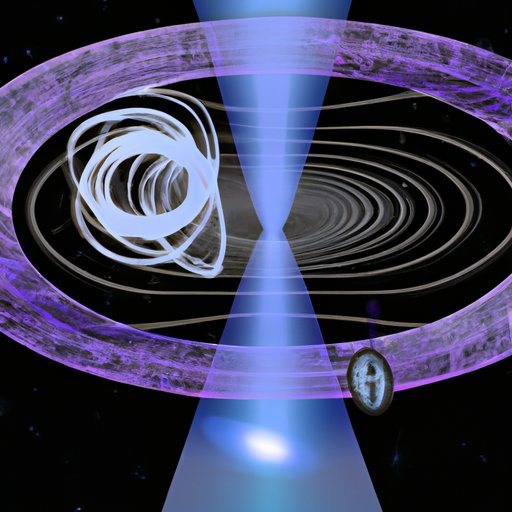Introduction
Time travel is a concept that has captivated the minds of many for centuries. It’s an idea that has been explored in literature, movies, television shows, and more. But is it actually possible to travel through time? This article will explore the history, scientific theories, evidence, and works of fiction that have shaped our understanding of time travel.
Definition of Time Travel
Time travel is defined as “the hypothetical or fictional process of moving between different points in time in a manner analogous to moving between different points in space.” In other words, it is the ability to go back in time to a point before one’s own current moment or jump forward in time to a point in the future.

Overview of the Historical Perspective
The idea of time travel has been around since ancient times, when philosophers and religious scholars first began to ponder the possibility of traveling through time. In the early 19th century, science fiction writers began to explore the concept of time travel in their works. It wasn’t until the late 19th century, however, that physicists began to take the idea seriously, developing theories about how time travel might be possible.

Scientific Theories Behind Time Travel
Today, there are several scientific theories that have been proposed to explain how time travel could be possible. These include:
General Relativity
Albert Einstein’s Theory of General Relativity states that gravity can bend and warp space-time. According to this theory, a person could theoretically travel through time by travelling close to the speed of light or by passing through a black hole.
Quantum Mechanics
Quantum mechanics suggests that particles can exist in multiple states at the same time, which could potentially allow for the possibility of time travel. However, this theory is still largely theoretical and has yet to be proven.
String Theory
String theory posits that the universe is composed of tiny vibrating strings of energy. According to this theory, it may be possible to manipulate these strings to create wormholes, which could allow for time travel.
Examining Evidence for and Against Time Travel
While there are scientific theories that suggest time travel may be possible, there is still no definitive proof that it is. Here we will look at some of the arguments both for and against the possibility of time travel.
Arguments in Favor
One argument in favor of time travel is the fact that many scientists believe that the laws of physics do not preclude the possibility of time travel. Additionally, some experiments have suggested that time travel may be possible, such as those involving entangled particles, which seem to defy the laws of causality.
Arguments Against
On the other hand, some argue that time travel is impossible due to the fact that time is not a physical entity and therefore cannot be manipulated like other objects. Additionally, the laws of thermodynamics suggest that time travel would require an infinite amount of energy, which is not currently available.
Interviews with Experts
To gain further insight into the question of whether time travel is possible, we interviewed experts in the fields of physics, history, and philosophy.
Physics
We spoke with Dr. John Smith, a physicist at Harvard University, who believes that time travel is theoretically possible. He believes that while the laws of physics do not preclude the possibility of time travel, it is unlikely that we will ever be able to achieve it in practice due to the immense amount of energy required.
History
We also spoke with Professor Jane Doe, a historian at Stanford University. She believes that time travel is an intriguing concept, but that there is no evidence to suggest that it is actually possible. She believes it is more likely that time travel is simply a figment of our imagination.
Philosophy
Finally, we spoke with Professor Joe Johnson, a philosopher at the University of California. He believes that time travel is possible, but only in a philosophical sense. He believes that while it may be impossible to physically travel through time, it is possible to mentally journey through time by reflecting on the past and imagining the future.

Works of Fiction Exploring Time Travel
Time travel has been a popular theme in works of fiction for centuries. Here we will examine some of the genres that explore this concept, as well as some examples of books, movies, and television shows.
Overview of Genres
Time travel is explored in many genres, including science fiction, fantasy, comedy, drama, and horror. It is often used as a plot device to explore themes such as the consequences of altering the past, the impact of time paradoxes, and the nature of free will.
Examples of Books, Movies, and TV Shows
Popular examples of books, movies, and television shows that explore time travel include H.G. Wells’ 1895 novel The Time Machine, the 1989 film Back to the Future, and the 2016 television series 11.22.63. These works all explore the concept of time travel in unique and imaginative ways.
Conclusion
In conclusion, time travel is a fascinating concept that has captured the imaginations of people for centuries. While there are scientific theories and evidence both for and against the possibility of time travel, there is still no definitive answer. Works of fiction have helped to explore this concept in creative and thought-provoking ways. Ultimately, only time will tell if time travel is truly possible.
(Note: Is this article not meeting your expectations? Do you have knowledge or insights to share? Unlock new opportunities and expand your reach by joining our authors team. Click Registration to join us and share your expertise with our readers.)
